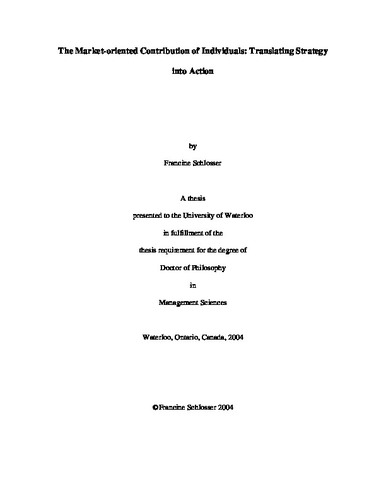| dc.contributor.author | Schlosser, Francine | en |
| dc.date.accessioned | 2006-08-22 13:49:58 (GMT) | |
| dc.date.available | 2006-08-22 13:49:58 (GMT) | |
| dc.date.issued | 2004 | en |
| dc.date.submitted | 2004 | en |
| dc.identifier.uri | http://hdl.handle.net/10012/819 | |
| dc.description.abstract | This research explores the management problem of how individuals can influence the development of a strategic orientation within a firm. A market orientation strategy builds upon three dimensions: the organisation-wide acquisition, dissemination, and co-ordination of market intelligence (Jaworski & Kohli, 1993). Such management of market-based information requires a set of distinct dynamic capabilities or routines. Empirical research about the association between market orientation and performance shows that firms that develop these capabilities improve both their organisational and financial performance (Gray, Buchanan, & Mallon, 2003). This research attempts to understand the circumstances that prompt employees in all areas of an organisation to become accountable for the implementation of a market-oriented strategy. To date, studies have inadequately measured individual contribution to the market orientation of a firm and do not understand each employee's personal responsibility and willingness to act in a market-oriented way. In response, this thesis developed a dynamic, multi-dimensional scale of individual market-oriented behaviour. First-stage research used focus groups and extant literature to construct a measure of individual market orientation. Then, a cross-section of financial services employees completed a web-based survey measuring individual market-oriented behaviour and individual and interpersonal antecedents. Confirmatory factor analysis confirmed the presence of a single latent construct with three dimensions. Study results identified a strong and significant relationship between the performance of market-oriented behaviours and the perception of a high-quality fulfilled psychological contract with the employer. Employees who were agile learners and frequently in contact with customers were also more likely to practice market-oriented behaviours. | en |
| dc.format | application/pdf | en |
| dc.format.extent | 926119 bytes | |
| dc.format.mimetype | application/pdf | |
| dc.language.iso | en | en |
| dc.publisher | University of Waterloo | en |
| dc.rights | Copyright: 2004,
Schlosser, Francine . All rights reserved. | en |
| dc.subject | Management | en |
| dc.subject | market orientation | en |
| dc.subject | psychological contract | en |
| dc.subject | learning orientation | en |
| dc.subject | customer contact | en |
| dc.subject | dynamic capabilities | en |
| dc.title | The Market-oriented Contribution of Individuals: Translating Strategy into Action | en |
| dc.type | Doctoral Thesis | en |
| dc.pending | false | en |
| uws-etd.degree.department | Management Sciences | en |
| uws-etd.degree | Doctor of Philosophy | en |
| uws.typeOfResource | Text | en |
| uws.peerReviewStatus | Unreviewed | en |
| uws.scholarLevel | Graduate | en |

